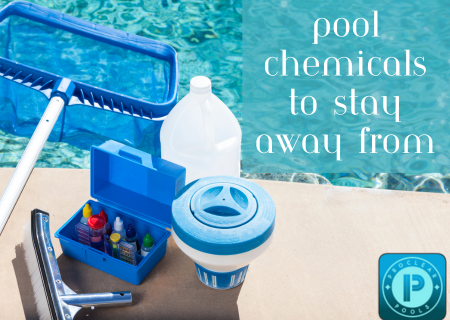 For many, swimming pools are a source of fun and recreation during the summer months. However, some common pool chemicals can be irritating or even dangerous if mishandled or misused.
For many, swimming pools are a source of fun and recreation during the summer months. However, some common pool chemicals can be irritating or even dangerous if mishandled or misused.
Pool Chemicals That Require Caution
- Chlorine – One of the most common pool chemicals is chlorine. Chlorine is a disinfectant used in most pools to kill bacteria and prevent the growth of algae. While chlorine helps keep pool water clean when used properly in the correct concentrations, exposure to high levels of chlorine gas can be toxic and irritating. Always follow the directions when handling and dispensing chlorine and avoid inhaling the fumes. Never mix chlorine tablets or granules with other chemicals, as poisonous chlorine gas may result.
- Bromine – Like chlorine, bromine is a disinfectant used to control bacteria and algae in pools. Bromine can be irritating to the eyes, respiratory system and skin, especially in high concentrations. Follow the directions carefully when handling and dispensing bromine and avoid inhaling the fumes, while many see this as a necessary pool chemical, you should use caution.
- Muriatic acid – Muriatic acid, or hydrochloric acid, is used to lower the pH level and alkalinity in pool water. However, muriatic acid is highly corrosive and the fumes are toxic. Always handle muriatic acid with extreme caution while wearing proper protective equipment like goggles, gloves, and protective clothing. Never inhale the fumes or splash it on your skin.
- Calcium hypochlorite – Calcium hypochlorite, also known as pool shock, contains high levels of chlorine for super-chlorination of pool water. While effective as a disinfectant, calcium hypochlorite is a strong oxidizer that can be explosive if mishandled or mixed with other chemicals. Only handle and dispense according to the directions, while avoiding any contact with the skin.
- Dichlor – Dichlor, or sodium dichloro-s-triazinetrione, is another form of chlorine used to disinfect and oxidize pool water. Like other chlorine compounds, dichlor can be irritating to the respiratory system and skin. Always exercise caution and proper ventilation when handling and dispensing dichlor.
- Algaecide: Algaecide is used to kill algae in your pool water. However, some algaecides can be harmful to your health. For example, copper sulfate algaecide can cause skin irritation and nausea.
- Metal Deactivator: Metal deactivator is used to remove metal ions from your pool water. Metal ions can cause your pool water to turn cloudy and can also make it difficult to get the chlorine level right. However, metal deactivator can also be harmful to your health. For example, silver metal deactivator can cause argyria, a condition that causes your skin to turn gray.
If you are unsure about which pool chemicals to use, it is always best to consult with a pool professional. They can help you choose the right chemicals for your pool and can also teach you how to use them safely.
In summary, the pool chemicals that keep our pool water clean can be hazardous if misused or mishandled. Always follow the directions carefully, wear proper safety equipment, and avoid
